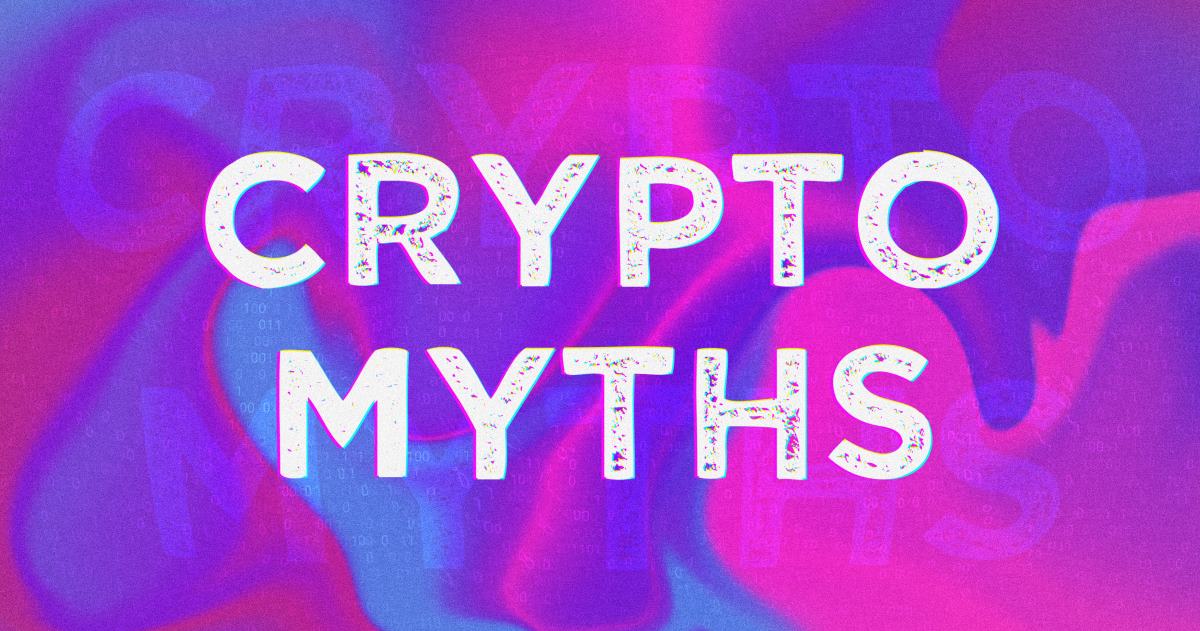
Breaking Down 5 Widespread Myths about Crypto
Jul 14, 2021In April of 2021, The New York Times declared "we're all crypto people now." It's true -- over the past year, digital currencies have entered the collective consciousness as never before. But great change is often met with great resistance, and crypto is no exception. Misconceptions about the nature and capabilities of blockchain technology have grown almost as fast as adoption. Myths and rumors about illicit activity, environmental impact, and network inefficiency are easy to find.
The most powerful weapon against misinformation is truth. In that spirit, here are five of the most widespread myths about cryptocurrency -- and the ways in which they miss the mark.
#1: Cryptocurrencies don't have real value
If cryptocurrencies don't have any real value, then neither does the U.S. dollar, gold, or anything else that people tend to deem "valuable". The reality is that, as many experts have argued, all forms of money are "shared illusion[s]."
Whether it is bits of paper, metal, or numbers on a screen, money exists simply to help people easily quantify and exchange value. In other words, money holds value because people use it and collectively agree it is valuable. Digital assets are no different than paper money or precious metals in this regard.
And it's clear that more and more people agree on the reality of cryptocurrencies' value -- in the 12 months between June 2020 and June 2021, the total value of cryptocurrency investments has grown from less than $270 billion to nearly $1.5 trillion.
#2: Blockchains are too private -- or not private enough
Private and public are terms often associated with blockchains in ways that can seem confusing and even contradictory to many. The technology is fundamentally premised on ideas of both personal autonomy and transparency. Blockchains shield real-world identities to a much greater degree than traditional financial systems -- a feature that has led some to claim their primary purpose must be for clandestine or illicit activity. At the same time, all transactions made on a public network like Bitcoin or Ethereum are visible to anyone -- a level of transparency far greater than that found in traditional, gated economic systems.
Some blockchains are private, or "permissioned," by design. On the other side of the coin, public blockchains like Ethereum are not truly anonymous. Rather, they are pseudonymous -- all transactions that take place on the network are visible and linked to a public wallet address. This public identifier is associated with a private key that only the users knows -- not with any other real-world identity. Nevertheless, the public ledger makes it possible to see transactions made by the same wallet -- and therefore to make inferences about the identity of the wallet's owner.
The truth is that blockchains represent a new, more robust, more transparent way to record transactions and store information. They are designed to offer people more autonomy and control over their own actions and decisions than is possible in the traditional financial system -- a fact that can lead to greater access to essential services like banking and credit, among other things. But just how private or public a given chain or layer-2 solution is depends on the needs and goals of each project. Orchid's mission is to make online privacy available to everyone around the world, and our team has designed a solution to enable that as strongly as possible.
#3: Blockchain technology is too slow and expensive to support everyday transactions
Another common argument against blockchains is that they are too expensive and too slow to support the volume of transactions needed to truly dominate mainstream industries. And it's true that some blockchains have struggled with price and transaction speed. But this is due to the still-nascent nature of decentralized networks and economies. Three decades ago, it took hours to download a single song over a dial-up modem -- but the Internet eventually grew to provide unlimited hours of high-quality streaming video for billions.

And solutions to the problems of speed and cost are already being delivered: many blockchains have arisen recently with much lower transaction costs, such as xDai, with which Orchid is compatible. xDai's low gas fees have already brought the cost of using Orchid as low as $1 -- and that's just the beginning. Many layer-2 solutions already exist, allowing for much faster transaction speeds than the underlying chain. Orchid's probabilistic nanopayments, for instance, can support millions of users every second. Layer-1 chains are being improved as well: the switch to Ethereum 2.0, for instance, promises to greatly improve that network's speed.
#4: Cryptocurrencies are mostly used for criminal activity
This allegation is one of the oldest and most popular beliefs about cryptocurrency. How true is it?
While the claim that blockchains' primary use case is illicit activity can be an easy and appealing tactic for critics to resort to, in reality, the tie between blockchains and crime is tenuous. According to a 2021 report by cryptocurrency analytics firm Chainalysis, just 2.1% of all transaction volume (roughly $21.4 billion) consisted of criminal activity in 2019. In 2020, this figure dropped to just 0.34% (approximately $10 billion). If the current trajectory continues, crypto-related crime will comprise a smaller and smaller component of all network activity over time.
#5: Cryptocurrencies are a scam
The "scam" allegation is the broadest, and probably most common, myth about blockchain. It is true that questionable or opportunistic projects have been a feature of the blockchain landscape since the birth of the industry. And the idea that novel, complex, or disruptive ideas stem from bad intentions is not a new phenomenon; it was also true during other transformational moments as well. Frauds and lost fortunes also characterized the first Internet boom, for example. But the failures of so many ambitious founders did nothing to negate the true power of the technology they were attempting to exploit.
And for every crypto scam, there are dozens of legitimate projects with highly transformative, game-changing use cases. As the crypto industry matures, instances of fraud are diminishing. In 2020, cryptocurrency fraud was down 57% compared to 2019, dropping from $4.5 billion to $1.9 billion.
To assert that "cryptocurrency is a scam" -- often with little understanding of how the technology works or what its applications are -- is to disregard the true innovation and change that has already been achieved by digital assets -- not to mention those who stand to benefit the most from it. Many people are locked into cycles of poverty because they cannot get a government ID or bank account. Blockchain has the ability to help these by offering them financial and informational autonomy -- which can lead to a genuine increase in freedom.
Is there any truth to these myths?
It's certainly true that blockchains and digital currencies -- like any new and powerful technology -- have important challenges to overcome. Addressing concerns about speed, and cost in particular, will be crucial tasks in the coming years. But we must not lose sight of blockchain's tremendous potential to reshape and improve the economy and the world -- including Internet privacy -- or of the remarkable progress that has already been made.
Regardless of external commentary, the Orchid team remains hard at work building a truly decentralized, open-source Internet privacy tool for people everywhere. And by making privacy affordable, accessible, and fast, Orchid's decentralized VPN network is helping reclaim the Internet as a place of freedom and curiosity.
Anyone can start using Orchid's decentralized VPN for as little as $1. Download Orchid today.
If you enjoyed this blog, subscribe here for privacy news, commentary, and product updates from Orchid.



